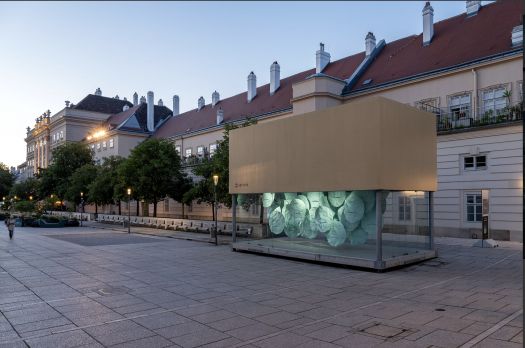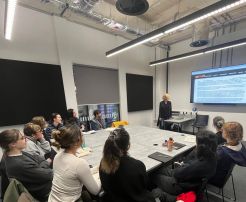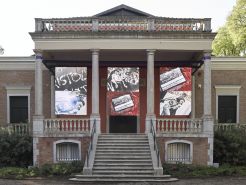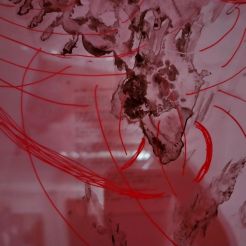Victoria Fox and Holly Hare talk about their Vienna residency experience
30 October 2024
MA Contemporary Curating students have been awarded the "Curators of Tomorrow" fellowship
The “Curators of Tomorrow” fellowship residency program is designed mainly for students who are about to engage with the professional practice stage of their MA Contemporary Curating studies at Manchester School of Art to develop an international profile.
The Fellowship is mostly self-directed and each participant is given the opportunity to live and work for the period of one month in one of the MQ studios at MuseumsQuartier Wien in Vienna and two of our emerging curators Victoria Fox and Holly Hare have been selected participants of this fascinating initiative.

Victoria and Holly joined us in this interview to reflect on their academic experience with their MA studies as well as their residency experience with their fellowship, conducted by Dr Gulsen Bal, Programme Leader in MA Contemporary Curating.
Gulsen: Could you please tell us about yourself and your experience with your academic studies on the MA Contemporary Curating programme at Manchester School of Art? So, let’s start with Victoria…
Victoria: My curating interests lie in a mix between the historical and the contemporary. I have a deep interest in socially engaged art and installations or conceptual pieces that speak of the human experience, our positions within the world or that are personal to the artist and the audience in an emotive way. My experience on the MA course has been great, not only for improving my skills and scope of ideas but I feel I’ve had the opportunity to network and engage with others in the field who I want to work with and have felt inspired by. I also feel my confidence in my abilities as a curator and art historian have been solidified and this course has been the catalyst for that.
Holly: Before starting my masters in Contemporary Curating I had recently completed an undergrad in Fashion Design and Promotion. Embarking on a career in curation was a natural evolution for me as a creative throughout my studies, as my process was heavily focused on creatively collating research and storytelling.
I was able to further specify my identity as a practitioner through Contemporary Curating course supported by aspirational industry guest lecturers and curriculum. The programme at Manchester School of Art has opened me up to the Manchester contemporary art scene and international curatorial opportunities. The abundance of opportunity within the programme allows a wealth of choice to customise your studies to align with individual interests.
Gulsen: Could you please tell us what inspired you to apply to this specific international Fellowship and what you hoped to achieve through this unique fellowship opportunity?
Victoria: I had never done a Fellowship before so I was excited by the prospect, I think what made this one stand out was its intimate nature, to get to live within the Museumsquartier, to see it at all points throughout the day and night and really be a part of the way it works for the city and the people, was really unique. I had also never been to Vienna before, so I felt it was a rare and privileged opportunity to get to know a city and its people in relation to the way it incorporates art and how the galleries and systems work within that context. I also enjoyed the mixture of participants that I got to work with during the fellowship, creatives who work in different fields like sculpture, painting, writing, graphic design, filmmaking. It gave us all an opportunity to learn from each other in different ways and understand different mediums and the artistic process involved in each one.
Holly: The fellowship with Museums Quartier was specifically exciting for many reasons. MQ itself is an incredible model for an art institution that is accessible and beautifully diverse. The various galleries and projects that work in harmony with one another create an environment buzzing with creativity and community. Having the opportunity to be a part of this community and collaborate with the other artists in residence is an experience I felt necessary for me to develop as a curator.
Gulsen: What are the curating issues you hoped to address through your residency? And maybe you could share your thoughts about the benefits of embarking on a one-month fellowship in Vienna and how this impacted on your curatorial thinking?
Victoria: I wanted to look at how different cities encouraged or integrated the arts for the lives of their citizens, and I wanted to see how those citizens captured or held onto a sense of cultural resilience in such a globalised world. Vienna was incredible for this, it felt unique and special in many ways. My curatorial thinking coming away from my residency was mainly one of hope. I feel in England now with the lack of funding, care, and opportunities in the arts it can feel like you are fighting a losing battle, but Vienna and the Museumsquartier, its staff and its artists, and the atmosphere in the arts in Vienna in general, reinvigorated that hope for me. It felt the city really cared about the people there, and creating places for them to experience art and culture. I feel I will work to bring that attitude into Manchester, and beyond into every project I work on and it definitely has enhanced my way of thinking curatorially, to find ways to make any idea happen, and to believe in the power of art and culture; that if you can find ways to provide it, the people will come, enjoy and experience it.
Holly: Throughout my residency I was exploring the interplay between capitalism, colonialism and patriarchy in the aesthetics of the city and the impact this has on artistic institutions. I was working towards a publication that encompassed my multifaceted practice of academic research, curator-as-writer and graphic design.
The one-month fellowship was an opportunity to live the aspiration of being able to immerse fully, uninterrupted by the pressures of work and study. This gave me the time to hone my curatorial skills, assisted by working alongside other creatives.



